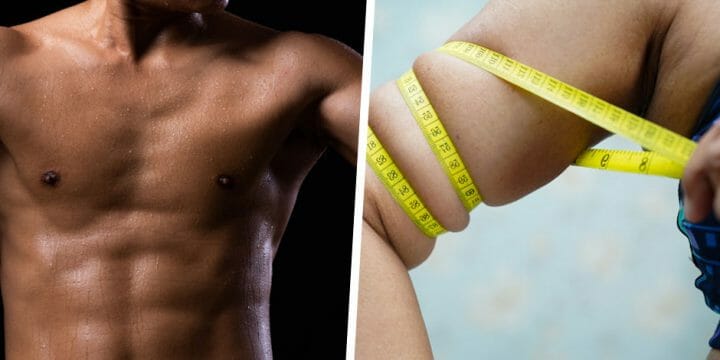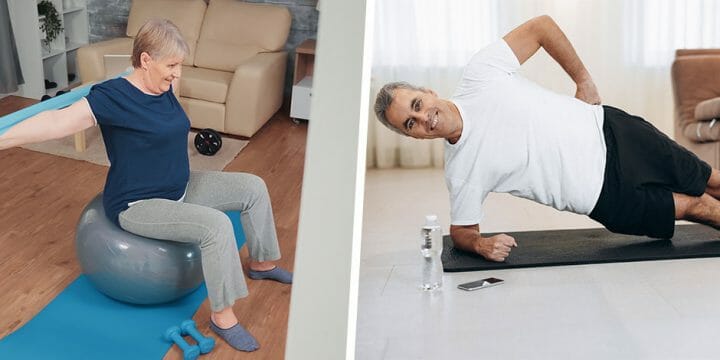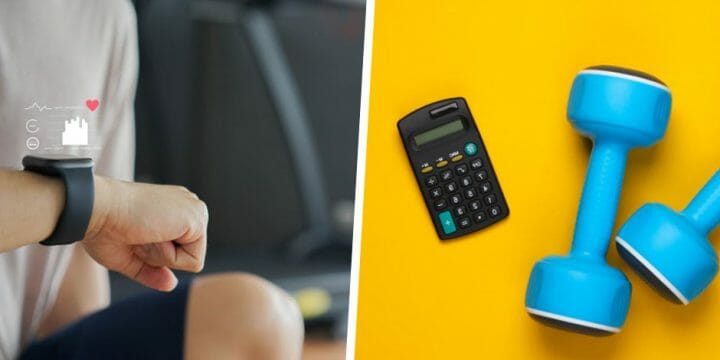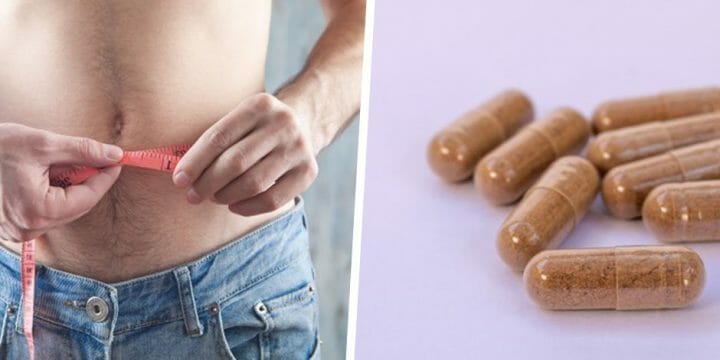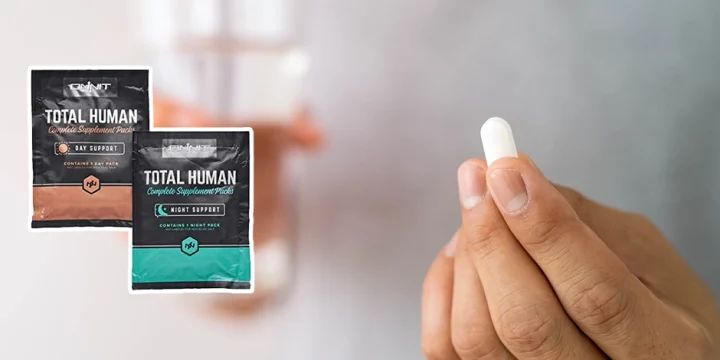What if I tell you that you can increase your calorie intake and still lose weight? It sounds counterintuitive knowing the main rule for weight loss is a calorie deficit, right?
Not entirely, because during my long career, I’ve seen this method help some clients lose body weight, especially when they hit plateaus.
To build upon my knowledge and experience, I spend a few days sifting through relevant studies and reviewing the results with my dietitian.
These are our findings.
Quick Summary
- To lose weight effectively, it's possible to eat more by focusing on balanced meals that include proteins, complex carbs, and healthy fats.
- It's important to avoid muscle catabolism and maintain a healthy metabolic rate by consuming sufficient calories.
- Men need an average intake of 2500 calories daily to maintain weight and 2000 for weight loss, while women should aim for 2000 calories for maintenance and 1500 for losing about one pound per week.
- From my experience, the concept of eating more to lose weight is effective when it involves nutrient-rich foods that enhance metabolism and muscle preservation.
How Come You Can Eat More to Lose Weight?

You can eat more to lose weight because our bodies are complex biological machines with sophisticated adapting mechanisms to calorie disbalance, and they burn fewer calories when there’s not enough fuel.
My clients find that once they start eating more balanced meals, they begin to lose weight.
However, even when dieting, the worst option would be undereating because it will bring more harm than good, especially in the long run.
What Happens When We Are Constantly Undereating?
When you reduce caloric intake to get into the caloric deficit, your body begins to change the way it burns body fat.
Without enough calories from food, the body tries to find another fuel source and starts breaking down less favorable tissues.
According to a study in the New England Journal of Medicine, if that calorie deficit prolongs for an extended period, the body switches to a conservation state called ‘starvation mode’ to prevent it from eating itself completely [1].
Muscle Catabolism
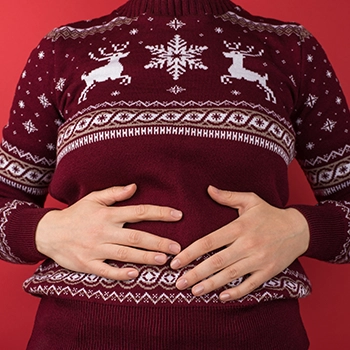
In this state, the body slows down metabolism or basal metabolic rate (how many calories your body burns daily at rest) and switches energy sources from exclusively glycogen (stored glucose) and body fat to muscle tissue [2].
This is called muscle catabolism, and it’s far from the best way to lose weight. Many of my clients experience it when they notice their strength diminishing despite losing weight.
You should avoid this condition since muscles are highly metabolically active, being among the body’s highest energy consumers, so the less muscle you have, the less energy expenditure occurs.
On top of that, according to a study in the National Library of Medicine, a prolonged strict low-calorie diet eventually increases the stress hormone cortisol in the body, making weight loss an even more challenging task and carrying a lot of potential unwanted health issues [3].
That’s why sometimes you need to eat more calories to lose weight.
More Food - More Efficient Body
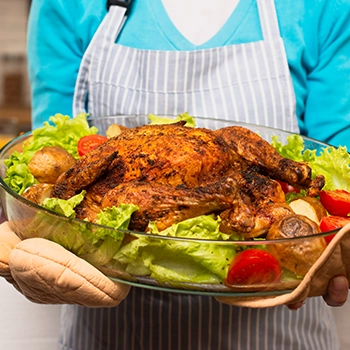
To prevent muscle loss and keep a healthy metabolic rate, you need to eat enough calories to feed the muscle tissue.
My clients report that when they started eating more, especially proteins and complex carbs, they actually felt their bodies becoming more efficient and energetic.
But even more important than the amount of food is the type of food you provide your body with.
Eating foods that increase metabolism and contain enough protein will give your muscles their building blocks and also keep you satiated longer [4].
A similar goes for foods rich in complex carbs and fiber as they will keep you less hungry, prevent carb cravings, and utilize more energy necessary for their slow digestion.
“High protein foods can also help with weight loss by decreasing hunger and promoting a sense of fullness. High protein diets are extremely effective in weight loss because they preserve muscle mass and prevent decreased metabolism.”
- Brittany Dunn, MS & Certified Sports Dietitian
This way, more calories will come from healthy foods rich in those macros - veggies, fruits, nuts, whole grains, and lean proteins.
Psychological Benefits of Eating More Food
Eating more will also alleviate the feelings of deprivation, making weight loss look like a less laborious task.
It will positively affect your willpower (as we only have a limited amount daily) and likely prevent you from binge eating episodes.
Personally, I found that eating more healthy foods made me feel less deprived and surprisingly made my weight loss journey feel easier.
Overall, this diet, combined with weight lifting to burn fat, should preserve your muscles and keep your metabolic rate relatively high while on a slight calorie deficit, prompting your body to burn calories from fat, preferably.
Related Article: What to Eat for Lunch to Lose Weight?
What About This NEAT Process?

A considerable role in how many calories we will burn in a day plays a process called ‘Non-exercise activity thermogenesis (or NEAT), and it’s a thing many people tend to overlook.
It’s the energy burned on activities other than breathing, exercise, digesting, or eating and involves small movements throughout the day, like chores and any kind of manual labor.
A study in the National Library of Medicine showed that when participants were provided with extremely low calories, their NEAT scores dropped [5].
On the contrary, participants who consumed too many calories daily had a better NEAT score.
These results can be associated with more energy production that may provide you with conscious efforts to move more.
However, this phenomenon is not universal, as many people tend to gain weight when the NEAT score doesn’t compensate for increased calorie intake.
Role of Specific Nutrients in Weight Loss When Eating More
Here's how certain nutrients contribute to weight loss and overall health.
Proteins
Proteins play a significant role in satiety. They help you feel full longer, reducing the likelihood of snacking on high-calorie, low-nutrient foods.
Foods high in protein, such as lean meats, fish, legumes, and dairy products, should be a staple in your diet.
Complex Carbohydrates
Complex carbohydrates are key to a weight loss diet where you're eating more. Unlike simple carbs, which cause spikes in blood sugar levels followed by crashes, complex carbs provide a steady release of energy.
This steady energy release helps in maintaining a consistent energy level throughout the day, reducing cravings for quick sugar fixes.
Foods rich in complex carbohydrates include whole grains, legumes, and starchy vegetables.
Healthy Fats
Healthy fats, found in foods like avocados, nuts, seeds, and olive oil, are necessary for the absorption of fat-soluble vitamins (A, D, E, and K). They also contribute to feelings of fullness, helping to curb the appetite.
Vitamins and Minerals
Vitamins and minerals are involved in numerous metabolic processes in the body. A diet rich in fruits, vegetables, whole grains, and lean proteins ensures you get a wide range of these essential nutrients.
How to Tell If I’m Not Eating Enough?

The number of calories required differs from person to person based on gender, activity level, and goals.
Yet, the average men’s general guidelines are to consume 2500 calories daily to maintain body weight and 2000 a day if the goal is to lose one pound a week.
For women, recommended maintenance calories are 2000 and 1500 calories or less to lose approximately one pound a week [6].
Anyhow, being on a calorie deficit is obligatory to lose weight, but you have to watch out for signs of not eating enough or if those weight loss efforts start to interfere with your health.
I realized I wasn't eating enough when I constantly felt tired and irritable, a clear sign my body needed more fuel.
1. Often Getting Sleepy and Tired
If you feel sleepy, foggy, or tired multiple times during the day, even after a good night’s sleep, it may be a sign your energy levels are low and that you aren’t getting enough fuel.
To test if the root of the problem is low-calorie consumption and blood sugar imbalance, try taking some snacks (like protein bars) or adding three meals separated equally throughout the day.
2. Food Obsession
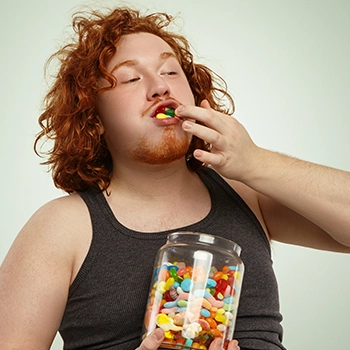
Losing weight and being hungry always come in a package, and it’s normal to some degree.
However, if food is the first thing that comes to your mind when you wake up, or you think about food constantly, and it drives your self-control on the verge of breaking, you are most likely not giving your body enough to function properly.
Joel Evan, an integrative health practitioner, says the easiest way to know if you’re eating enough between meals is to gauge your hunger.
If you’re still hungry within 3-4 hours of eating a meal, you probably didn't eat enough and should prioritize protein as your macronutrient.
3. Feeling Irritable and ‘Hangry’
Many of my clients find that not eating enough makes them irritable and 'hangry,' affecting their mood and productivity.
In the modern world, it means - mood swings, a shorter temper, and less patience.
To avoid it, you might want to start eating slightly more calories to reach your threshold.
Other negative effects of not eating enough food, especially for longer, include headaches, loss of menstrual cycle, hair loss, and brittle fingernails.
What Else Should You Consider for Weight Loss?
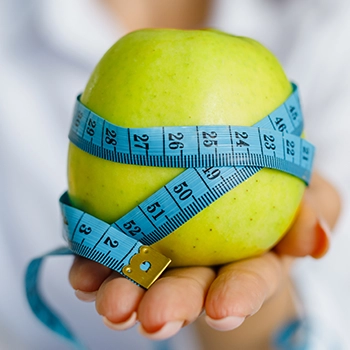
Losing weight faster could become more manageable if you eat healthily, exclude processed foods, and include weight training, to avoid the trap of slow metabolism.
If your diet is a quality mixture of balanced macros - healthy fats, complex carbs, and proteins - you will acquire highly metabolically active lean body mass.
Furthermore, a healthy diet (fruits, veggies, whole grains, and healthy fats) will provide you with vitamins and minerals crucial for proper body functioning and energy production.
Lastly, you should consider natural fat-burning supplements that combine herbs and certain nutrients to significantly increase thermogenesis and reduce your cravings without compromising your health.
FAQs
Does Eating More Make Your Metabolism Faster?
Yes, eating more can make your metabolism faster because, after your meal, the body speeds up processes to digest the food and turn it into energy. Consequently, eating more frequently could raise your basal metabolic rate.
Why Am I Not Losing Weight on 1000 Calories a Day?
You are not losing weight on 1000 calories a day because your metabolism probably slowed down, as your starved body is trying to preserve energy. The body needs those stored energy reserves to keep your metabolic processes running and keep you alive. Simply, your body has adapted.
References:
- https://www.nejm.org/doi/full/10.1056/NEJM199706193362507
- https://www.sciencedaily.com/releases/2009/06/090608091337.htm
- https://www.ncbi.nlm.nih.gov/books/NBK499909/
- https://journals.physiology.org/doi/abs/10.1152/jappl.1988.64.1.187
- https://www.ncbi.nlm.nih.gov/books/NBK279077/
- https://www.ncbi.nlm.nih.gov/books/NBK499909/
About The Author
You May Also Like
